Peter MALONE
Saturday, 18 September 2021 19:27
Beast, The
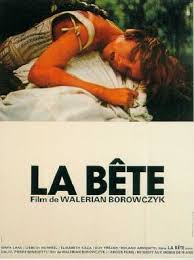
THE BEAST
France, 1975, 98 minutes, Colour.
Sirpa Lane, Lisbeth Hummel, Elizabeth Kaza, Pier Benedetti, Guy Trejane, Marcel Dalio.
Directed by Walerian Borowczyk.
The Beast is Borowczyk’s version of The Beauty and the Beast. Borowczyk was a painter and lithographer in Poland. He was a poster designer, made short films, animations in the late 50s. Most of his work was done in France as an animator and then in features. Over the decades he became a controversial film director because of his films being explicitly erotic and sometimes sensational.
He was famous in the 1970s for such films as Blanche, Immoral Tales and Behind Convent Walls. While this film is erotic in its presentation of the Beauty and the Beast story, it is not so explicit as some of his films during the 1980s.
1. The purpose of this film? Its impact? As an immoral tale according to its film-maker? As a moral fable? A fable about human nature, society? The validity of the erotic modes of the fable? (The justification of hesitation by censors?)
2. The film as the work of Walerian Boroyczyk? Polish background, working in France? His baroque style and attention to detail? His view of the constructions of society? His view of the interior repressions in personalities? The effect of the old world, its mythologies and legends? The use of symbolic animals to express these repressions, especially as regards sexuality, violence and greed? Their perspective of the director on human nature? how optimistic, pessimistic?
3. For what audience was the film made? How seriously?
4. The nature and validity of the erotic treatment of the subject? How much passion, how much sensuality? Was the film exploitive in any way? A valid psychological study of human nature, perversions, religion and society? The relationship of religion, society, sexuality?
5. How well did the film draw on the Beauty and the Beast legend? An erotic and perverse application of the legend? Or does the legend have these perversions implicit within it? The visual presentation? The intellectual application of the fable?
6. The significance of the opening and the emphasis on horses as animals, as beasts? The importance of sexuality and copulation? Sexuality and pleasure, breeding, instinct? The sound associated with animals and sexuality? The blending of visual& and sound? The importance of the implications and their later application? Maturin and his presence, affinity with these experiences and the irony of it?
7. The world of the old Duke? The appearance of the chateau, the interior, the furnishings? The modern world and yet all the trappings of earlier centuries? Decay, a world passed over? His personality, his dependence on Maturin? The mystery about Maturin and his baptism? His relationship with his nephew and their dialogues and interactions? His holding of power? The significance of his relationship with his brother as Cardinal? The importance of the background of his poisoning his wife and his nephew's hold over him? His brother's rejection of him, especially the phone sequences? What had he to live for? A symbol of decayed aristocracy? The decay of the values of the past? The importance of his death and its implications?
8. The contrast with the Duke, his nephew? His poise yet his desperation? His participation in the decay, his foreboding of disaster? The linking of this with nature? The past corroding his personality? His manipulation for the continuation of the line and yet its doom? His writing letters for Maturin? His plan for the Broadhursts? His plots against his uncle? The importance of the Broadhurst will and the necessity of the Cardinal being present? His desperate attempts to get the Cardinal to be present? Maturin and his shaving him and preparing him for Lucy's visit? Maturin not coping and the effect that it had on his father? The build-up to Maturin's death and his ultimate disappointment? The comment on aristocracy in France and its position, wealth, social standing, religion as embodied in this mad duke?
9. The mystery about Maturin? The training of the horses, his affinity with them? The mystery of his bathing, baptism, shaving? How well did the film suggest mystery and then shook when the explanation was given? His semi-human and semi-bestial behaviour at meals etc.? The mystery during the night? The pathos of his death? How well portrayed the beast character, symbol?
10. The contrast of Lucy and Virginia? Lucy and her photographs especially of the horses? Virginia and her greed and her protection of her niece? The background of wealth and society of the modern world intruding in this old world? What did the two societies have in common? The arrival, the room, the mystery of Maturin? The will? Lucy and her response to Maturin's so-called advances - really from his father? The bizarre behaviour at the will? The importance of the will? The effect of the experience on Lucy?
11. The fascination with the legend of the beast and the beauty in the 18th century? The significance of Lucy having similar dreams? The visuals of the dream and the presentation of the beauty and the beast how well portrayed was the beast in his bestiality, the communication of lust, the effect on the 18th century lady and her being reduced to bestiality? The dream fascination for Lucy? The importance of dreams and the comment given by Voltaire about a dream? The significance of man being beastly, woman being attracted? The brutality and the associations of blood? The blend of fantasy and reality?
12. Lucy wandering the corridors and the approaches to Maturin and the fright of his death? The advances of the beast and the beauty being the cause of death?
13. How convincing were the visuals of the beast? The effect on the audience?
14. The significance of the sub-plot with the duke's daughter, her seeming commonsense, preparation for the marriage and dressing of her children, her affair with the black servant? The character of the servant and his sexuality (hence of beauty and the beast, black and white, mistress and servant etc.?)?
15. The significance of the sub-plot with the priest, his bringing the boys and fondling them. his devotion to the music? The comment on celibacy, homosexuality? The Church and its attitudes towards sexuality?
16. The atmosphere of the wedding transferring to the atmosphere of the funeral? The madness pervading all of this?
17. The significance of the arrival of the Cardinal at the end? His moral theology textbook comments on what had happened, on bestiality and sinfulness? Confession? The ironic touches in the speech of the Cardinal? What is the director saying about the Church and its influence on human behaviour and attitudes towards sexuality?
18. How valuable is a film like this in its imaginative and free-ranging exploration of society, individuals, the psyche and human psychological dreams, fantasies and symbols?
Published in Movie Reviews
Published in
Movie Reviews
Tagged under
Saturday, 18 September 2021 19:27
Bachelor in Paradise
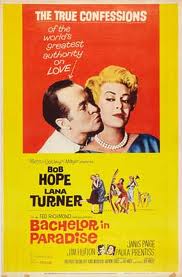
BACHELOR IN PARADISE
US, 1961, 109 minutes, Colour.
Bob Hope, Lana Turner, Janis Paige, Jim Hutton, Paula Prentiss, Don Porter, Virginia Gray, Agnes Moorehood, John Mc Giver.
Directed by Jack Arnold.
Bachelor in Paradise is a star vehicle for Bob Hope. After appearing in many comedies, especially with Bing Crosby, and making his mark at Paramount with such comedies as Paleface, he spent the 1950s making a long string of humorous slapstick comedies with wisecracks. This changed at the beginning of the 1960s with The Facts of Life and Critic’s Choice with Lucille Ball. After these films and Bachelor in Paradise he moved to smaller-budget, more slapstick films and did a great deal of work on television. His unlikely co-star in this film is Lana Turner who had completed her contract at MGM and had moved into a world of soap opera films starting with Peyton Place and appearing in Imitation of Life. By 1965 she was to appear in a remake of Madame X. However, in this film they are an interesting team.
The focus is on a writer, a best-selling writer of travel books who has tax difficulties and responds to a suggestion that he should write a book about suburban life. This involved him being attracted to many of the women in the area and their reactions to him. This was the beginning of the era of many similar sex comedies, probably characterised best by Doris Day- Rock Hudson comedies.
The film was directed by Jack Arnold, a competent director of a wide range of films from The Creature of the Black Lagoon to The Mouse That Roared.
1. The enjoyment of a Bob Hope comedy, his style and humour, wit, style of characterisation, satire on things American? Was this a good example of his comedy?
2. The significance of the title, the focus on the bachelor, the focus on Paradise with its heavenly Old Testament and Temptation aspects, the humour of its being used for a modern American suburban development? The many ambiguities in the title indicating theme?
3. The use of colour, cinemascope, singing, music? The glossy tone?
4. The film as a piece of Americana? Domestic comedy, American sex comedy? Acuteness of observation of the American way of life, attitudes both socially and morally? Satire on this?
5. The humour and risque aspects of the opening? Adam Niles and the salacious nature of his books? His observation on particular nationalities? How did the film share this power of observation in a satiric way? Its attack on moral protesters against book they haven't read etc.?
6. The American humour in the money situation, taxation, American preoccupation with money? The financial situation as a contrived framework for the rest of the plot?
7. The presentation of Paradise: the people who were there, the houses, the amenities, the predictable way of life, neighbours, the presentation of the beginning of the day in quick motion? The children, supermarkets and accidents, cooking? While poking fun at the American suburban way of life, did the film show its good points?
8. The wives in this kind of world, their study background, their wanting to better themselves? The importance of the influence in their life, his seminars, their femininity? The satire on the American woman trying to be French and sexy? The humour and yet the criticism of men in their harsh reactions to their wives? The Americans as unromantic, candlelight, changing of hair etc.?
9. How did the film focus on Linda to present this kind of character? The critical and satirical presentation of husbands?
10. The importance of Rosemary and her greater sophistication compared with the other wives? Her divorce background, her work, her showing them over her own home and his sarcastic reaction? The detailed resistance of Rosemary to all the advances? The changing of this into love? A low key and ironic battle of the sexes?
11. The presentation of the Jinsons: the husband preoccupied with building and with money, suspicion? The wife and her feeling neglected, her advances? The scenes at home, the washing machine in the flat, people's gossip, the encounter at the restaurant?
12. Comment on the gossiping woman, her attack in the book and the reason why Rosemary would not sign the petition? Her looking at television, her ringing people up? A good critique of this kind of person?
13. The resolving of the financial situation, Palfrey and his exploitation of advertising and the satire on the exploiters? The court case device for bringing everything together, how appropriate, contrived? The reaction of the wives, the reactions of the husbands? statement and proposal to Rosemary? The humour of the ambiguity with only women in the house, Rosemary's declaration under oath? The humour on the resolution with the tape recorder?
14. The quality of this comedy, the blending of Lana Turner and Bob Hope and their different styles? A comment on American mores of the 1960s?
Published in Movie Reviews
Published in
Movie Reviews
Tagged under
Saturday, 18 September 2021 19:27
Bodyguard, The / Telokhranitel
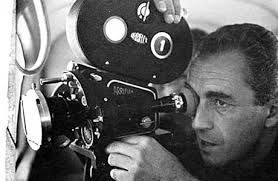
THE BODYGUARD (TELOKHRANITEL)
USSR, 1979, 90 minutes, Colour.
Directed by Ali Khamrayev.
The Bodyguard is an entertaining film, somewhat difficult to follow for an audience not familiar with aspects of Russian and Afghanistan history. The film gradually explains its characters and its plot as it unfolds.
The film is beautifully photographed and capitalises on the grandeur of scenery in Eastern Russia and Afghanistan. There is a range of seasons, a range of desert and mountain locations. The colour photography is superb. The period is exotic - the early twenties and the civil wars in the republics of Middle Asia. While the emphasis is on adventure, there is a strong propaganda vein throughout the film, especially at the end. The treatment is ultra-heroic - perhaps in the heroic styles of the setting of the film. However, it is very reminiscent of the heroic westerns with literal cliffhangers. This adds to the enjoyment although not to the plausibility of the film. It is certainly an example of a different kind of Russian film, from the adaptations of their classic literature or to contemporary stories.
1. Russian cinema and its various styles? History, regional interest? the heroic treatment? Ideological background? obtrusive or not?
2. The beauty of the colour photography, the sepia effects and the action sequences? The heroic score?
3. The historical perspectives? The Republics of Middle Asia? The Asian way of life and the influence of the Russians? Civil war, the Russian revolution, the armies? The ideological reaction to the Republics falling, and becoming the Soviet Union?
4. The background of the military situation, power struggles? A transition from 10th century Republics to the Soviet Union?
5. The Sultan and his daughter in themselves, guarded by the Red army, the transfer and its political intent, the power of the Sultan, his severe personality, his daughter and her devotion to him, the devoted cook and other members of the entourage? Fattobek and his power seeking, pressure from his wife, relentless pursuit? The bodyguard and his devotion to getting the Sultan to his destination? The Sultan and his participation in the adventures, his hostility, the physical demands of his illness, Fattobek taking his power from him, the struggle and final rescue? His stubbornness and finally giving in? His future in the Soviet Union?
6. The heroic body guard, his mountain background, his skills, helping the Sultan through so many adventures, capacity for endurance, the imprisonment, destruction of the snake, the final rescue of the Sultan especially across the cliff, the final fight with Fattobek? The ideological ending and his future?
7. Kova and his mountain background, the enthusiastic young guide, participation in the adventures? Loyalty to Larzo? The other members of the group? their trials on the mountains?
8. Fattobek and his power seeking, his wife as a sorceress, her capacity for prophecy? The iconic way in which she was presented? The relentless pursuit, the first failure? Fattobek's cruelty to his own group? The capture and imprisonment? The final pursuit and relentlessness? The fight to the death?
9. The pictures of the soldiers, common people? Action, suffering? The group rescuing the Sultan by masquerading as clowns? The sorcerer trying to heal the Sultan? A flavour of the Asian area of the action of the film?
10. The importance of the atmosphere, the terrain, the remote Republics, the traditions? The emphasis on the Asiatic? religious, superstitious, loyalties?
11. The basic framework of the journey and endurance? Courage?
12. The ultra-heroic presentation? the cliffhanging style? The parallel with the American Westerns? The action adventure, Russian style ?
Published in Movie Reviews
Published in
Movie Reviews
Tagged under
Saturday, 18 September 2021 19:27
Black Narcissus
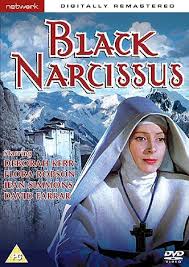
BLACK NARCISSUS
UK, 1947, 100 minutes, Colour.
Deborah Kerr, David Farrar, Jean Simmons, Sabu, Kathleen Byron, Flora Robson.
Directed by Michael Powell and Emeric Pressburger.
Black Narcissus is considered a British classic film. Written and directed by The Archers, Michael Powell and Emeric Pressburger, it was made in London studios in 1947. Jack Cardiff was the cinematographer and found ways of recreating the atmosphere of India and its location scenery in the studios.
The film is interesting insofar as it is a high melodrama, set amongst the Indians and the British who lived there before partition. The focus is on a young prince played by Sabu and a young girl infatuated with him, played by Jean Simmons in an early role. The other focus of the film is an Anglican community of sisters where Deborah Kerr (at the age of twenty-six) is the Superior. Flora Robson is also in the community as is Kathleen Byron in her most stand-out role as the tormented and insane Sister Ruth.
The film recreates the atmosphere of the convent, touches of repression, touches of kindness, the way that religious life was expected to be lived in those days. David Farrer plays a local authority who plays havoc with the emotions of the sisters. There is a highly melodramatic final confrontation between Deborah Kerr and Kathleen Byron.
Deborah Kerr made I See a Dark Stranger at this time with The Archers. At this time also, she went to Hollywood to star in The Hucksters with Clark Gable and began a very successful career there. She also acted as a nun, a Catholic nun, in Heaven Knows, Mr Allison. (She also appeared in the spoof, Casino Royale, disguised as a nun.)
The Archers were a powerful force in British cinema, especially in the 1940s. Some of their outstanding films include The Life and Death of Colonel Blimp, A Canterbury Tale, The Small Back Room. At the end of his career, after a scandal associated with the horror thriller, Peeping Tom, Michael Powell made two films in Australia: They’re a Weird Mob and Age of Consent.
1. The title referred to perfume and to the young General. Was this an adequate title for the film? Why?
2. The film concerned nuns. Was it a religious film? Why?
3. How did the film communicate the atmosphere of India? its remoteness, its life and styles, and its influence on people, especially Europeans?
4. Was the narrative technique successful? Was the film colourful in its presentation of India and effectively so? How?
5. Initial impressions of the Nuns? In the discussion of the foundation and the choice of the nuns to go? In the choice of Sister Clodagh as Superior? Why was she chosen? Was this a wise choice? Was the foundation of the Convent in the mountains a sensible decision? Why? The personality of Sister Clodagh: her attitude toward her choice as Superior, her superior attitudes, did her past life explain her? her love for the man who went to America, the home life and the solitude of Ireland. gifts and girlishness? Was disappointment in love the sole reason for her entering the Convent? Had she overcome this motivation in her dedication? Was she truly concerned with the welfare of the Sisters? How well did she relate to them? Understand them? Why was she so haughty towards Mr. Dean? Did she try to impose her own ideas and those of the Society on people? Why did she change? Was it the place? The work? The influence of Dean? The irony of the Convent being in the General's palace? What irony came through this? The chorus treatment of the caretaking lady? How effective was this?
8. The Sister gardener - the reason for her going to the foundation? Why did she find it difficult? Her role in the garden? Her planting flowers instead of vegetables? Her wanting to get away?
9. Sister Bryony: her strength, her concern for her patients, her role in the community? How did the remoteness and the work there affect her?
10. Sister Honey - her kindness and understanding? Her contribution to the community? her over-reaction to the sick child? How was she affected by the atmosphere? What influence did her behaviour have on their ultimate success? Especially with the death of the baby and the refusal of the people to come?
11. Sister Ruth? What was wrong with her? Why was she so neurotic? Why was she a nun? Why hadn't she gone earlier, since vows were annual? Why did she go to the foundation? Why was she jealous of Sister Clodagh? Was she really attracted to Mr Dean? How do you explain her jealous behaviour? The impact of the sequence where she was dressed and made up? Her madness in running away? The effect of Dean's rejection of her? How mad was she when she fought with Sister Clodagh at the bell? Was her death too melodramatic?
12. Why did the old General have the foundation? Especially since the Brothers' foundation, failed? What did he expect from the Sisters? What effect were they supposed to have on the people? Why did he pay the people to come? Would it have become a habit with them?
13. The role of the young General, the black Narcissus? As the younger generation in India? his ambitions for learning, his typing, his attendance at classes? The reaction of the nuns to his personality, to his clothes etc? His falling in love with the young girl? Was this credible?
14. The young girl and her relationship with Dean? Her life in the convent? Her trying to lure the young Prince and her success? Was this credible? Her being punished? What aspect of India did she represent?
15. The sequences of teaching and nursing and the tolling of the bell? How well did they communicate what the nuns were doing?
16. Why were there so many clashes of personality and changes in personality? In such scenes as the Christmas Carols and Dean's drunkenness?
17. Why did the foundation and the nuns break down? Was this inevitable?
18. Was the climax with Sr Clodagh and Sr Ruth a symbol of what was happening with them all?
19. What had Sr Clodagh learnt by the end of the film? Had she changed? Was it better that she go back into community and not be Superior?
20. This film is considered by many as a classic. Why?
Published in Movie Reviews
Published in
Movie Reviews
Tagged under
Saturday, 18 September 2021 19:27
Big Knife, The
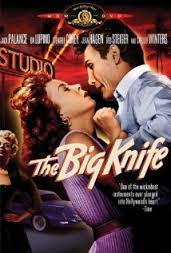
THE BIG KNIFE
US, 1955, 104 minutes, Black and white.
Jack Palance, Ida Lupino, Wendell Corey, Jean Hagen, Shelley Winters, Rod Steiger.
Directed by Robert Aldrich,
The Big Knife is a film about the dark side of Hollywood. The Bad and the Beautiful had appeared three years earlier, focusing on an unscrupulous director. This time (**film?), The Big Knife, focuses on a Hollywood star who wants to make into better films and is confronted by a crumbling career, pressure from the studios, failure in his marriage. The two films are companion pieces.
The film offers a fine role for Jack Palance who appeared in many films of this period but who was destined to be a character and action film star. There is strong support from Ida Lupino as his wife, Rod Steiger as the studio executive and Wendell Corey as an agent.
The film was directed by Robert Aldrich, winning for him the Silver Lion at the Venice Film Festival in 1955. Aldrich had begun in small films such as The Big Leaguer, moving to Apache and Vera Cruz in 1954. With his Mickey Spillane adaptation, Kiss Me Deadly, and The Big Knife he moved into a higher-bracket film-making, following it with Autumn Leaves and Attack. By the early 1960s he was one of the top-bracket directors with such films as The Last Sunset, Sodom and Gomorrah, Whatever Happened to Baby Jane, Hush Hush Sweet Charlotte. He directed the Rat Pack in Four for Texas and went on to make The Flight of the Phoenix and The Dirty Dozen. He continued a very successful career during the 1970s with a range of action films like Too Late the Hero, Ulzana’s Raid, Emperor of the North Pole and two films with Burt Reynolds, The Longest Yard and Hassle.
There have been many films about Hollywood and its oppression and dark side. This is one of the best.
1. To what does the title refer? Its connection with the ending?
2. The final emotional impression of the film? Why?
3. Did the film deal with real people and real situations?
4. Comment on the structure of the film: the opening credits with Charlie Castle's face, the play structure of the film, the dialogue very heavy, the opening sequence with Pattie Benedict, the centrality of Charlie Castle and each of the characters meeting and encountering him?
5. Was this a just picture of Hollywood? Why? What impression did it make? How is Hollywood an image of the world of power struggles and cruelty and deception?
6. How was power and power struggle an important theme of this film? How did each of the characters illustrate this? Final impressions about the nature of power and the struggles between human beings for domination?
7. How was love a theme of this film? Especially between Charlie and Marion? The relationship between the Blisses? Connie Bliss and Charlie? Marion and Hank? Loyalties and families and careers and human emotions?
8. What kind of person was Charlie Castle - was he well explained at the beginning of the film, with his ambitions and lost ideals, and his need for survival? What more to be found out about him? Was he courageous, a tiger? What had destroyed him? Had he destroyed himself? The power of others over him, his failures, his weakness for women, his deceptions? Comment on his encounters with each of the major characters? What did he finally make of himself at the end of the film? Who drove him to death? Was this death well prepared for? Did Jack, Palance make a convincing Charlie?
9. What was your opinion of Marion - how well did she love Charlie? How good a wife and support was she? Why was she so faithful? Was she selfish in any way? Did she push Charlie too hard? Why did she resist the offer of Hank for marriage? What support did she give him at the end? How happy did she make him in his death?
10. What kind of person was Stanley Hoff? Was he a caricature? Are big businessmen like this? Why did he have such followers as Smiley? Why was he cruel, why did he talk about himself all the time, his brutality to Dixie? His brutality and pressures on Charlie? His fear of physical pain? Was there anything likeable about his character?
11. What kind of person was Smiley? How did he become like this? How cruel, calculating, feelingless? Comment on his change of attitudes and emotions for every situation? Was he a happy man? Did he feel anything towards Dixie Evans and murdering her? Comment on his reaction to Charlie's suicide?
12. Nick: as a picture of devotion to Charlie, the audience's possibility of identifying with Nick and friendship towards Charlie? His reaction to Charlie's death?
13. Budd: as an agent, as going to prison for Charlie, his relationship with his wife, the impact of his final disillusion scene with Charlie?
14. The sequence with Connie Bliss - what did it reveal, about her, as a Hollywood unhappy wife? Of Charlie playing up to her? Of her attitude especially about the accident and prison?
15. Dixie Evans: in herself, as a disillusioned starlet, drinking? Her attitude towards Stanley Roff? Her relationship with Charlie and her speech about the studio? As a victim of the studios, even to being murdered? The importance and irony of her accidental death?
16. Hank Teagle: his friendship with Charlie, his drinking, as a novelist with insights into human beings, his devotion to Marion? His coming to the support of Charlie, especially at the end?
17. Comment on the dramatic impact of the clashes between personalities in this film. What impact did they have?
18. Comment on the moral issues and values of the people in this film.
19. The impact of Charlie's death and its pessimistic outlook on human living, human personalities, their being crushed?
20. Was this an important film about Hollywood, about persons, about the world?
Published in Movie Reviews
Published in
Movie Reviews
Tagged under
Saturday, 18 September 2021 19:27
Bad and the Beautiful, The
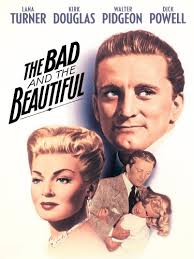
THE BAD AND THE BEAUTIFUL
US, 1952, 118 minutes, Back and white.
Lana Turner, Kirk Douglas, Walter Pidgeon, Dick Powell, Barry Sullivan, Gloria Grahame, Gilbert Roland, Leo G. Carroll, Paul Stewart, Elaine Stewart, Kathleen Freeman.
Directed by Vincent Minnelli
The Bad and the Beautiful is considered one of the best films about film-making in Hollywood. It is grim, focuses on the dark side of film production and the studios. It is said to have many of its scenes based on the life of producer David O. Selznick (Gone with the Wind) and Kathleen Freeman’s role is parallel to that of Alfred Hitchcock’s wife, Alma Revell. Leo G. Carroll is considered to be a director not unlike Hitchcock.
The film’s focus is on an unscrupulous director who came from B films to the top. He is played with successful ruthlessness by Kirk Douglas. The femme fatale, star, is Lana Turner. There are strong character performances by the supporting cast with Gloria Grahame winning an Oscar for best supporting actress. She also won the Golden Globe in this category and Gilbert Roland won for best supporting actor. The film won a number of Oscars including cinematography for black and white film, costume design for black and white film and screenplay for Charles Schnee.
The film was made fifty-five years or so after the invention of cinema. By looking at this film, one can see the development in film-making and techniques but also on the hold that cinema and movie-making had on those involved, the ruthlessness, the obsessions.
Vincente Minnelli had directed a number of very successful musicals including Meet Me At St Louis and a number of dramas including The Big Clock. He would ultimately win the Oscar for a musical, Gigi, but also continued to make a range of films including the biography of Van Gogh, Lust for Life, with Kirk Douglas, as well as Two Weeks in Another Town, another film about Hollywood, also starring Kirk Douglas.
1. This is considered the best of the films about Hollywood. Why? Its strengths and its weaknesses? Its homage to Hollywood, its parody, irony, insight?
2. The significance of the title, its ironies, its references to the main characters?
3. The quality of the black and white photography and special effects, the strength of the screenplay, the sets? The Oscar awards, did the film merit them? sets and photography, the way of shooting films, the tableau of the three at the end on the phone...?
4. The importance of the structure of the film: the question about Jonathan Shields, the nature of the flashbacks, the momentum of moving from one story to the other, the three commentaries on Shields, audience antipathy, the crisis, an awareness of hate and love? The final area of decisions? Hardness and a refusal, yet the hold of Jonathan Shields over the three characters in the light of what they had remembered? The overall impact of Shields's character and the meaning of his hold?
5. The presentation of Hollywood as a place, its ethos and mystique its good qualities and its bad, the achievement in cinema, the ruthlessness? What was bad and what was beautiful? The effect of Hollywood, and its people, on the main characters? Audience presuppositions about the nature of Hollywood?
6. The focus on the character of Jonathan Shields? The influence of his father, in terms of his arrangements for the funeral, his father's achievement and his wanting to achieve? The strengths of his ambitions? The loner who took others with him and then dropped them? The significance of the funeral and the clash with Fred? The friendship with Fred and their achievement in minor films? The details of Jonathan's involvement in this? The horror film, etc.? Fred's dreams and achievement? Shields easily selling him out? The use of Georgia? For his ambitions without regard to her? His pretence and coldness? His using of James Lee and his wife? Manipulating him? Sacrificing his wife? Shields as a man of inspiration? And yet a man who lost? How rounded the picture of Shields's character? His strengths and his weaknesses? His understanding of himself?
7. Pride before his fall? The significance of his crash? Directing his own film? His art and the shelving of the film and its effect on him? His final desperation and plea to his enemies? Would it all happen again?
8. His role in the film? As the man questioning Shields's enemies? The portrayal of the producer, films, typical Hollywood man, the business side and the bravo attitude? His attitude towards Shields and letting him fail? His working for Shields and supporting him? As a boss and as a subordinate? As a support and a Hollywood type? His support of Shields in his financial worries?
9. Sid as a Press Agent, his work with the stars and with the authors, for example James Lee? His loyalty to Shields?
10. How well delineated was the character of Prod? His cynical attitude at the funeral,~ his sharing of aims with Shields, their work together on 'B' pictures, their Cat Man horror film, success, his family and his dream of directing a great film? His being ditched, his hatred? His being made to stand on his own feet as Prod pointed out? The effect of Jonathan Shields on him?
11. How well delineated was the character of Georgia? First seeing her in the dark, the build-up about her father and his house, the daughter of her father, self-pity and drink, suicide? Her role in the screen tent when drunk? Her being seen, Jonathan's faith in her, her wooden screen test and yet people focused on her? Her fear, involvement in the rehearsals, being built up by Jonathan, depending on his love? Believing in his love? Her running away before the shooting? The details of her acting? The emotion in her death scene? The importance of her disillusionment scene? Her running away in the car and the emotional hysteria in the car? What had she achieved by the influence of Jonathan on her? Independence and stardom? What insight into the rise of a Hollywood star?
12. How well was the character of James Lee delineated? As a writer, a Southern man, the society of Virginia? His sour outlook? His love for his wife? Cynical attitude towards Hollywood? Despising Shields, working on the book, growing enthusiasm? Being inspired to work by Shields? His participation in the film, even though it was Shields's failure? His disillusionment in learning the truth? How was he affected by Shields? Writing a prize-winning book on his wife?
13. The importance of the character of Rosemary? A Southern belle, flighty, her love for James Lee, her giving papers to the group, her fascination with Hollywood, with Gaucho, her ambitions? Wondering whether she had changed for the better? The irony of her death and its effect on James Lee?
14. The character of Gaucho? Their initial hiring of him, the outing and his attitude towards Shields? His support of him over the years? The irony of his death with Rosemary?
15. How interesting was the film in its presentation of the detail of film production, the shooting of films, editing? The shelving of a failure?
16. What major themes were explored in the film: human themes, cinema themes, American themes?
17. The significance of the ending? The bitterness and cynicism, the fascination of a personality, the optimism? The final tableau of the three characters who had been influenced by Shields?
Published in Movie Reviews
Published in
Movie Reviews
Tagged under
Saturday, 18 September 2021 19:27
Back Street / 1961
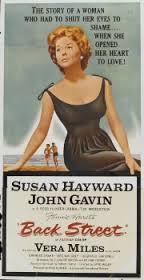
BACK STREET
US, 1961, 107 minutes, Colour.
Susan Hayward, John Gavin, Vera Miles, Charles Drake, Virginia Grey.
Directed by David Miller.
Back Street is the third version of Fannie Hurst’s popular novel. Its focus is on the illicit love between a married man and a woman – whom he relegates to the back streets of his life. The film’s focus is on how the woman makes good despite the relationship and the seeming rejection.
The stars of the film in 1932, directed by John M. Stahl, were Irene Dunne and John Boles. In 1941 there was a further version, directed by Robert Stevenson, with Margaret Sullavan and Charles Boyer. This version has Susan Hayward (not long after her Oscar-winning performance in I Want To Live) and John Saxon. The film was produced by Ross Hunter whose glossy romantic films from the mid-50s to the mid-60s have caught popular attention in retrospect: The Magnificent Obsession, All That Heaven Allows, Imitation of Life.
This version was directed by David Miller who began directing in the 1930s (including a film about Father Damian of Molokai, The Great Heart, in 1938. He directed the Marx Brothers in Love Happy and then had a success in the 1950s with such strong films as Sudden Fear and The Story of Esther Costello with Joan Crawford. During the 1960s he had a succession of hits with Midnight Lace, Lonely Are The Brave and Captain Newman MD.
1. The status of this story as a woman's soap opera novel, the traditions of soap opera films from the thirties to the sixties? (How well did it fit into the tradition of 'women's pictures'?)
2. The production values of the film, colour, music, the importance of decor, the colour of the furnishings and the fashions? The blend of story and decor? What kind of Hollywood world is this? How much real, how much fantasy, how much wishful thinking? towards the character of Rae?
3. The title and the implication of the affair with Paul? The change of emphasis to a more glossy back street?
Appropriate?
4. Audience enjoyment of soap operas? Escapism, some kind of understanding of human nature? How realistic do they intend to be? How symbolic of wishful thinking dreams?
5. The importance of emotional response from the audience, involvement with the characters, happiness and especially tears? The relationship between emotional response and judgment about characters and behaviour?
6. The opening and the involvement of the audience in the war situation, airport, a place for chance encounters? Paul and Rae and the details of their meeting? The build up of the relationship between the two? The credibility of Rae falling in love? Paul and his love and yet his attitude towards his wife and children? Their time together? The irony of the missing of the plane, the car? Accidents and the extraordinary way of controlling destinies? How credible this separation and Rae's reaction?
7. The effect of the passing of the years, the mutual bitterness? The style of the passing of time and the focus on Rae's career, Paul getting older?
8. Susan Hayward's style as Rae? Her origins, her talent, work in the shop, ambitions? Her impact on the world of fashion, collaboration with Dallan? Audience interest in this world of fashion and glamour? Dictating fashions, wealth, international trips etc.? Her prospering yet her loneliness?
9. The encounters with Paul and the effect on each of them? Rae's bitterness, Paul's exasperation? The mutual love still remaining?
10. How fair was the screenplay in presenting Liz as so hysterical? Her behaviour, dialogue, cattiness, suspicions, violence and drinking? Was it inevitable that Paul would turn away from her? Did he love her? His devotion to his children? The effect of this upbringing on them? What made them decide to begin the affair? The back street aspect of the apartment? The pros and cons of their relationship? How did it change each of them?
12. The effect on Paul Junior? On a young boy and his reaction to his parents, to Rae?
13. Liz and the growing hysteria and drinking? Comment on the melodramatics of her public denunciation of Rae? The effect on Rae? Audience sympathies?
14. The build up to the crash, how credible was the screenplay not taking the easy way out by letting Paul live?
15. The dramatics of the final phone call, Paul Junior hearing his father? effect on Rae?
16. The impact of the ending with the children with Rae? Their future?
17. How valuable is the immersion in this kind of soap opera world? Tears, sympathies, emotional values, judgments?
Published in Movie Reviews
Published in
Movie Reviews
Tagged under
Saturday, 18 September 2021 19:27
Bachelor Party
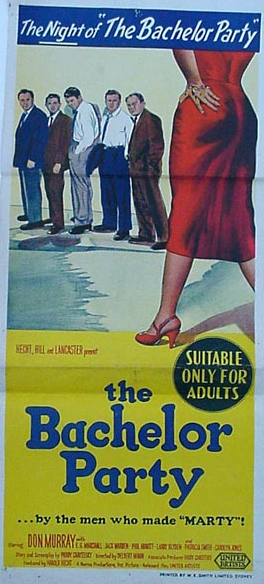
THE BACHELOR PARTY
US, 1957, 95 minutes, Black and white.
Don Murray, Jack Warden, E.G.Marshall, Carolyn Jones.
Directed by Delbert Mann.
The Bachelor Party comes from 1957 (and should not be confused with the rather leering Tom Hanks vehicle, Bachelor Party, of 1984).
This film was written by Paddy Chayevsky, prolific playwright for the golden years of television in the 1950s and whose films included Marty, The Catered Affair, The Goddess, Middle of the Night and The Americanisation of Emily.
The film was directed by Delbert Mann who won an Oscar for directing Marty. He was to direct a number of serious films during the 50s and 60s but moved to directing television movies in the 70s and 80s, many of them quite memorable and with serious themes.
One of Chayevsky’s main achievements, not long before he died, was Network.
This is a film about men discussing their lives, marriages, relationships. Don Murray is the hero (he had emerged in such films as Bus Stop at this particular period). Veterans E.G. Marshall and Jack Warden are also in the cast. Carolyn Jones won an Oscar nomination for best supporting actress.
The film is very serious-minded as are so many of Chayevsky’s films. In some ways it is depressing as the men explore the difficulties in their lives and marriages. (There seemed to be a rather inappropriate tag line for the advertising of the film, rather the opposite of what happened: They live it up tonight!)
1. The emphasis of the title, audience expectations, indications of theme?
2. The importance of the black and white photography, city locations, the emphasis on details in particular sequences, sharpness of dialogue?
3. How particularly American was this film? in its settings and characters, in its themes?
4. What insight into the nature of modern marriage did the film give? into love, relations, family, the economies of family?
5. How pessimistic was this film in its presentation of human nature? how optimistic at the end? Did the optimism ring true, especially with the preceding sequences?
6. What moral standards underlay the whole film? The nature of good and evil for modern people? in terms of marriage and relationships? in terms of identity and ambitions?
7. How important was character for this film? Were the characters real, unreal in any way, ciphers or symbols of attitudes?
8. How important was the central character? Audience sympathy for him, identification with him? The relationship with his wife, his ideas on family, the coming child? Why did he decide to go to the party? The effect of the party, the men and their problems on him? The drink and the atmosphere? The threat to marriage in his eyes? The insight that he gained into his companions? The dominance of Eddie, the needs of Arnold?
9. The contrast with Charlie's wife? The picture of the details of family life contrasting with the party, the reality of marriage, the relationship to Charlie? The reconciliation and its value at the end?
10. How central was Eddie? The bachelor type, the explanation of his background, his relationship with the other men and his dominance, his forcing the pace of the party and the details of what was done, his grossness, the effect of drink, his disillusionment with himself and the emptiness of his life? The basic message and values communicated through this character?
ll. Arnold as the occasion for the party, his earnestness and yet his fears, the effect of the others on him, facing the responsibility of marriage, the cynicism of Eddie, the details of the party and their effect on him, his phone call to his friend, the wisdom that Charlie gave? Was this credible?
12. The contrast with Walter, financial questions, business, health, driving oneself into a grave for one's ambitions?
13. Kenneth and his promiscuity, the failure of his marriage? His point of view and advice to Arnold?
14. The importance of the character of Julie: commenting on what the bachelor party was like, her advice to her sister, her fears?
15. Comment on the success of details for building up the atmosphere for the characters, the restaurants, Eddie's flat, the prostitute, the party, the drinking, the existentialist and the significance of her conversation about life, her nymphomania?
16. How useful are films like these for ordinary audiences to get a glimpse of the values of marriage?
Published in Movie Reviews
Published in
Movie Reviews
Tagged under
Saturday, 18 September 2021 19:27
Bachelor Flat
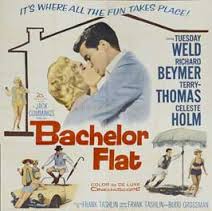
BACHELOR FLAT
US, 1962, 91 minutes, Colour.
Terry Thomas, Richard Beymer, Tuesday Weld, Celeste Holm.
Directed by Frank Tashlin.
Bachelor Flat is a comedy of the early 1960s. It was written and directed by former cartoonist, Franklin Tashlin. Tashlin had made a long string of successful light comedies in the 1950s including Son of Paleface, Susan Slept Here, The Girl Can’t Help It as well as a number of Martin and Lewis films including Artists and Models or Hollywood or Bust and then collaborated for almost ten years with Jerry Lewis himself, Rockabye Baby, The Geisha Boy, Cinderfella, It’s Only Money, Who’s Minding the Store, The Disorderly Orderly. At this time he also directed Danny Kaye in The Man from the Diners’ Club.
Terry- Thomas had been very successful in British comedies in the late 1950s. He was popular in the United States and here portrays a British professor who is a honeypot for impressionable women. His fiancée, Celeste Holm, has neglected to tell him that she has a teenage daughter (Tuesday Weld). There are romantic complications, especially when Terry- Thomas’s roommate, played by Richard Beymer (West Side Story) becomes infatuated with Tuesday Weld.
A fluffy romantic comedy with the usual complications and ambiguities.
1. The quality of this comedy, its particularly American style: fast, types, caricature, mistaken identities, sex emphasis?
2. The focus on Terry- Thomas, the adaptation of his comic style to America? Bruce as a person, the warmth of his characterization even within the farce, personality qualities? The English type in California, the quiet and refined Englishman, the professor, the middle aged man becoming a sex object?
3. The basic marital situation as a basis for farce, Helen and her absence, as a type, her stay in France, her not telling the truth about Libby? Her expectations of Bruce? Bruce and his expectations of her? The emphasis on his 'properness'?
4. The contrast with Michael, the young American type, off-hand, lazy, part-time student, a flirt? The inevitability of his love for Libby? Yet his being the butt of a lot of the comic violence? A farcical subject? Did he have a definable character?
5. The focus on Libby, the device of her arriving in the house, binding their characters together? Her character, her pretence, its TV origins? The satire on the tough American girl? The satire on the young American romantic girl? Her effect on each of the characters?
6. The farce and the parody in the lecture sequences, the pursuit of the professor by the women, the various types of women, the satire on them? Michael's theory about the pursuit of women, his theory about being aggressive? His getting the professor drunk and its farcical presentation?
7. The standard conventions of his being in the house, the police arriving, escapes?
8. How good a Terry-Thomas? comedy was this, the various sequences where he was made demands of, his dreams etc.?
9. The picture of the American way of life, Its funny aspects, ugly aspects? How enjoyable and telling is this kind of farce and satire?
Published in Movie Reviews
Published in
Movie Reviews
Tagged under
Saturday, 18 September 2021 19:27
Bachelor and the Bobbysoxer, The
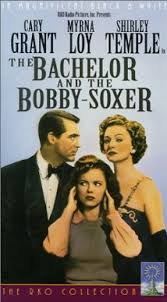
THE BACHELOR AND THE BOBBYSOXER
US, 1947, 95 minutes, Black and white.
Cary Grant, Myrna Loy, Shirley Temple, Rudy Vallee.
Directed by Irving Reis.
The Bachelor and the Bobbysoxer was a very successful comedy of 1947. It had the teaming of Cary Grant with Myrna Loy, who at this time, made another successful comedy, Mr Blandings Builds His Dream House. It also is one of the earliest adult roles for the young Shirley Temple. Crooner Rudy Vallee also appears.
The film presents Cary Grant as the fulfilment of the fantasies of the two sisters. One is the older sister, very serious, Myrna Loy, the other is the bobbysoxer of the post-World War Two period, Shirley Temple.
The film won an Oscar for best original screenplay by novelist Sidney Sheldon.
An entertaining look at the atmosphere of the United States in the mid-40s, after World War Two, the emergence of women – and the bobbysoxer freedoms of that era.
1. How successful and enjoyable a comedy? The light, touch? A late forties comedy? An Oscar for its screenplay? The appeal of the style, its impact now?
2. This kind of comedy an reflecting America? The technical side& black and white photography, the humour, the wit and the light touch. farcical situations American style? The impact of the three main stars and their working together ? successfully?
3. The universal appeal of this kind of localised comedy: romance, man-woman relationships, generation gaps, responsibilities? Happy endings?
4. The tone of the title and the reference to the two characters? The alternate British title was 'Bachelor Knight'. The reference more to the fantasy of the visions of the two women? The bachelor as the fulfilment of dream wishes and fantasies?
5. The portrayal by Cary Grant with his style of the man-about-town: lecher, accidents, responsibilities and irresponsibility, way of life, wealth? The encounter with the family, with the Judge, with her sister, with the fiance? How interesting and enjoyable a portrayal in light comedy terms of the bachelor man?
6. The presentation of the two sisters - seriously, comically? The generation gap? The younger sister and the style of the bobbysoxer of the late forties? The more serious older sister? The bonds of family, the other members, the older members and uncles, aunts? Family? Humorous American types?
7. The focus on the younger sister, her bobbysoxer style, study, moods, ranges of interests, changes of attitudes, infatuation? The humour of the presentation of the infatuation, the bachelor knight, romanticising? Romanticising love? Being serious about going around? The outings and the humour of the clashes of mood between the bachelor and the bobbysoxer? Her gradual understanding of the situation, of herself? A bit of wisdom in her growing up?
8. The older sister as judge, serious attitudes, sense of responsibility, growing infatuation with the bachelor? The effect on her, the vision of the bachelor knight? Humanizing the older sister?
9. The humour of Rudy Vallee's style as the fiance, poking fun at this kind of man? The humour of a triangle?
10. How well did the film rely on the wit of its dialogue, humour, Cary Grant's offhand remarks? The accumulated detail of the situations as the lecher, meals, the outings, restaurants, picnics, the races etc.? Why the appeal? The strengths of this kind of comedy? The ordinary values that it represents and appeal to audiences?
Published in Movie Reviews
Published in
Movie Reviews
Tagged under